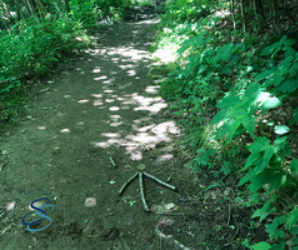Consider the story-worthy moments each day that you can incorporate into your speaking presentation.
Vacations and travel seem to be a priority this year as many of us are experiencing a pent-up desire to get out of our homes. Another benefit for traveling is it often provides opportunities to find good stories to support messages in our presentations. A well-told story that connects with our message never fails to engage and connect with our audience.
During the long fourth of July holiday weekend, my family spent some time in the North Carolina mountains. We hiked a trail known as Three Top Mountain which rewarded us with beautiful views from the summit. The trail down from the summit included another prize for me – a story that is begging to be told in a future presentation.
While hiking on the trail to reach the Three Top Mountain summit, my husband, sons, and I eventually separated as we all hike at different paces. During our hikes, we stop occasionally to regroup so that no one gets lost. We’ve been hiking long enough as a family to have adopted this ritual.
Nearing the summit of the mountain, I met a family coming down the trail as I was heading up. I observed the young boy in the family, who appeared to be about 10 years old, pointing out to his grandparents the arrow he had laid out on the trail to ensure that his grandparents, who had a much slower pace than the rest of his family, did not get lost. How clever and sweet, I thought to myself as I made my way up the remainder of the trail.
 On the hike down from the summit, and separated from the rest of my family, I came to a junction in the trail that I did not remember on my way up. (Funny how trails look different on the way down than they did on the way up!) I wasn’t quite sure if I should take a right or a left at the trail juncture. I felt a bit anxious for a few seconds as I envisioned myself having to spend the night in the woods because I had gotten lost! Then, it dawned on me to look for the arrows on the trail that the 10-year-old boy I met earlier had created for his grandparents. I searched the trail to find the arrows. Yes, I found one, then another. I felt reassured that I was going in the right direction, and safely made it back to the trailhead where I met the rest of my family. Little did that little boy know that his directional arrows helped more hikers than just his grandparents!
On the hike down from the summit, and separated from the rest of my family, I came to a junction in the trail that I did not remember on my way up. (Funny how trails look different on the way down than they did on the way up!) I wasn’t quite sure if I should take a right or a left at the trail juncture. I felt a bit anxious for a few seconds as I envisioned myself having to spend the night in the woods because I had gotten lost! Then, it dawned on me to look for the arrows on the trail that the 10-year-old boy I met earlier had created for his grandparents. I searched the trail to find the arrows. Yes, I found one, then another. I felt reassured that I was going in the right direction, and safely made it back to the trailhead where I met the rest of my family. Little did that little boy know that his directional arrows helped more hikers than just his grandparents!
You might be wondering, how does story-worthy moments relate to speaking presentations?
Here is what I know about storytelling, based on what I’ve learned from established and well-known storytelling experts, Matthew Dicks and Kindra Hall.
- The best stories are not necessarily about the BIG events, such as a plane crash or a life-threatening emergency. The best stories are about ordinary events in our lives. This makes them more relatable to our audience.
- Think about how you want to make your audience feel. Stories are about making an emotional connection with your audience. What kind(s) of emotions do you want them to feel?
- Start your story in a location. This paints a picture in your audience’s mind. We think in images, and the more specific you are with the location, the better picture you paint for your audience.
- Good stories have contrast and a conflict that needs a resolution. Contrast and conflict are what keep audiences interested.
- Several points can be derived from the same story – choose one that fits with your overall message. One point in my hiking story is about paying it forward, as you never know how many people can be impacted with a positive action. Or, this story could illustrate the value of listening to others. If I had not stopped to talk with the family coming down the trail, I would not have known about the arrows. This story also supports the point of being observant. Many of the arrows on the trails were not obvious. Best practice is to choose one message per story.
- Track your stories daily. Matthew Dicks suggests creating a log and writing down a story worthy moment that occurred each and every day. Granted, not all happenings in our lives are stage worthy. However, the practice of identifying and capturing those events daily enables you to elevate your ability to spot story worthy material. You can then craft the story to suit your purpose in your presentation.
What are your story worthy moments you are capturing this summer?
Want a storytelling tune-up? Book a 15-minute Discovery call.
